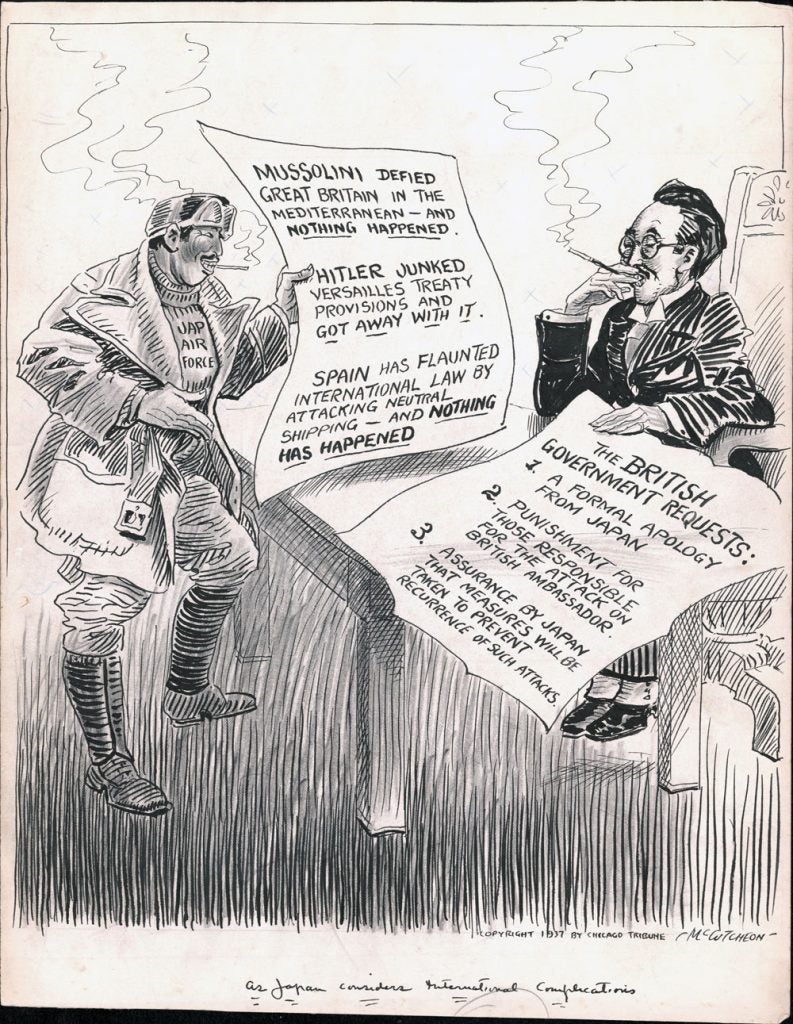
“Bad Weather Forecast from Benito’s Gout” (May 16, 1943)
by Hugh McMillen Hutton (1897-1976)
20 x 22 in., ink and crayon on heavy board
Coppola Collection
Hugh M. Hutton (1897-1976) was an American editorial cartoonist who worked at the Philadelphia Inquirer for over 30 years.
Hugh Hutton grew up with an artistic mother. After attending the University of Minnesota for two years, Hutton enlisted in the armed forces and served in World War I. Hutton pursued coursework in art through correspondence school, the Minneapolis School of Art and the Art Students League.
He worked at the New York World from 1930 to 1932 and with the United Features Syndicate in 1932 and 1933, drawing illustrations and comic strips. Hutton relocated to Philadelphia and worked as the cartoonist at the Public Ledger in 1933 and 1934. He became the Philadelphia Inquirer’s editorial cartoonist in April 1934, where he stayed throughout his career, retiring in 1969.
Mussolini, the father of fascism, partnered with Hitler in 1936.
Mussolini’s dreams of waging a short war almost independently from Hitler faded away during 1941 in the snows of Greece. His main concern became how to secure an important place for Italy in a German-dominated Europe. Hitler blamed his need to go rescue the Italians on the Greek front for delaying his invasion of Russia.
As the war turned against Germany, Mussolini wanted to find a political solution to the conflict by negotiating a separate peace agreement with Moscow.
May 10, 1943: On the day that the Enabling Act of 1933 was set to expire by its terms, Adolf Hitler signed an order extending his dictatorship indefinitely. Published in the Reich Law Gazette, the decree stated “The Reich government will continue to exercise the powers bestowed on it by virtue of the law of March 24, 1933. I reserve for myself the obtaining of a confirmation of these powers of the Reich government by the Greater German Reichstag.”
Following the defeat of the Axis Powers in North Africa in May 1943, there was disagreement between the Allies as to what the next step should be. The British Prime Minister, Winston Churchill, in particular wanted to invade Italy, which in November 1942 he called “the soft underbelly of the axis.” Popular support in Italy for the war was declining, and he believed an invasion would remove Italy, and thus the influence of Axis forces in the Mediterranean Sea, opening it to Allied traffic.
When it became clear that no cross-channel invasion of occupied France could be undertaken in 1943, the US agreed to invade Sicily, with no commitment made to any follow-up operations. However, both Churchill and FDR accepted the necessity of Allied armies continuing to engage the Axis in the period after a successful campaign in Sicily and before the start of one in northwest Europe.
With an Allied invasion of Italy imminent, Pope Pius XII sent an appeal to FDR, asking that American bombers spare the destruction of Rome, noting that its “many treasured shrines of religion and art” were “the precious heritage not of one people but of all human and Christian civilization”
By mid-June, 1943, the war was all but lost for the Italians. The Italian population was alienated, and the Grand Council and the king were pressing Mussolini to negotiate a way out of the war.
In late June, Mussolini was continuing his psychological contest with Hitler. On July 1, 1943, against the Hitler’s wishes, Mussolini met with the Romanian deputy premier, Antonescu, with whom he agreed to promote the long-debated inter-Axis conference (and a Nazi-Soviet settlement, which was of no interest to Hitler).
Allied forces landed in Sicily starting on July 10, 1943 and moved northward. Support for the war and for Mussolini had dropped substantially, and he was ousted on July 25, 1943. On September 3, an armistice was reached between the new government of Italy and the Allies. Hitler was already in the north of Italy, and the Italian peninsula became a contested war zone.
On October 13, 1943, one month after Italy surrendered to the Allies, it declared war on its one-time Axis partner, Nazi Germany.








